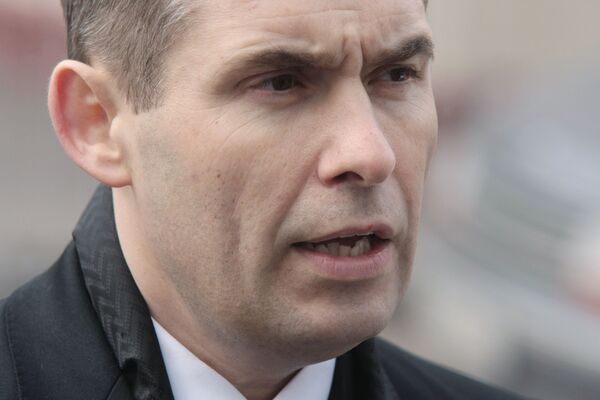A call by a Russian child rights official to halt foreign adoptions of Russian children, including in the United States, would result in more harm to a greater number of children, said US adoption experts Monday.
Russia’s Children’s Rights Ombudsman Pavel Astakhov called for the ban Monday at a hearing before Russian lawmakers in Moscow on US human rights issues.
Astakhov said the $1.5 billion adoption industry attracts unscrupulous people and that concerns over the future of orphans “are all lies.”
Astakhov’s call to ban foreign adoptions comes just as an exhaustive, bilateral agreement between the US and Russia to dramatically improve the adoption system is set to begin.
“Why we would just throw that away doesn’t make any sense,” said Kathleen Strottman, executive director of the Congressional Coalition on Adoption Institute (CCAI), a non-profit organization that works with policy makers to remove barriers to safe, successful adoptions.
“The two governments have been working in earnest for two years to address the concerns. This is a very solid agreement that will improve the outcomes for children,” Strottman said.
The US-Russian adoption agreement, signed into law in Russia by President Vladimir Putin and set to be phased in beginning November 1, mandates a number of changes including more screening and training for adoptive parents, and greater scrutiny post-adoption.
The US and Russia put the agreement into place “to promote stronger safeguards for adoptive children and parents in the inter-country adoption process,” said a US State Department official not authorized to speak on the record.
The official added that it incorporates several fundamental principles of the Hague Adoption Convention, which Russia has not signed. That agreement signed by 89 countries, including the United States, sets standards for international adoptions, and puts safeguards into place to prevent the abduction, sale and trafficking of children.
Russian officials claim at least 19 Russian children have died following abuse by American foster parents since adoption of Russian children in the US began in the early 1990s.
Since 1999, parents in the US have adopted more than 45,000 Russian children, including 962 children adopted last year.
The numbers are down in part because of more than a dozen high-profile adoption abuse cases.
A father in the US, who left his adopted toddler son in a hot car to die, was found not guilty of involuntary manslaughter, a ruling that infuriated many Russian officials.
They were also outraged when an American woman decided the 7-year-old boy she had adopted had too many emotional problems and put him on a plane back to Russia unaccompanied.
“That was the final straw that led to this agreement,” said Chuck Johnson, president of the National Council for Adoption, a non-profit advocacy group that works to promote a culture of adoption.
But he adds, with an estimated 700,000 children in orphanages or other state-run care facilities, the idea that Russia can serve the needs of its institutionalized children without an international adoption process doesn’t work.
“They have an orphan epidemic in their country,” said Johnson. “Inter-country adoption will never be the cure but it is a viable solution, a viable option.”
Strottman said an increasing number of Russian orphans have been institutionalized in Russia for longer times, and more of them have been exposed to alcohol and other substance abuse, factors that lead to significant physical, emotional, social and developmental delays, and make adoptions very challenging for both parents and children.
“As we have learned more about the needs of these children who are adopted, we are better able to prepare adoptive parents,” she said.


